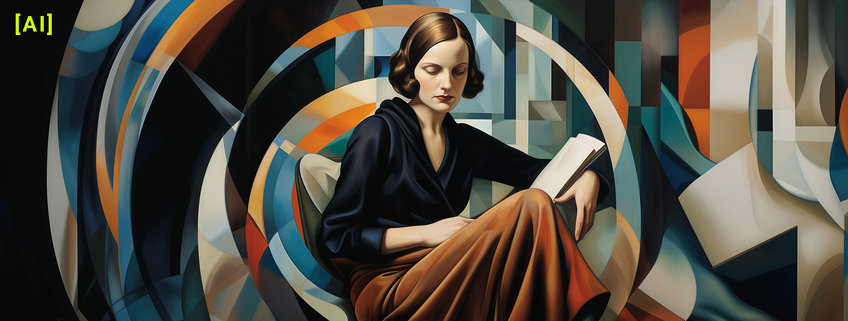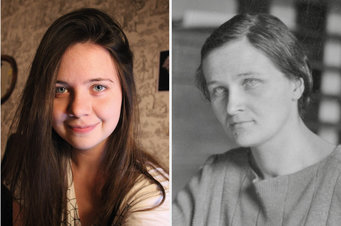
"A great source of inspiration"
Franciele Kruczkiewicz from the Max Planck Institute for Extraterrestrial Physics about Cecilia Payne-Gaposchkin
Cecilia Helena Payne-Gaposchkin is one of the most important figures in the history of astrophysics. Her groundbreaking research on the composition of stars changed the way we understand the universe. She discovered that our sun consists largely of hydrogen and helium, correcting the prevailing assumption of the time that the entire universe consists of the same elements as the earth.

Born in England in 1900, Cecilia Payne originally intended to study botany at Cambridge University. But a lecture by the astronomer Sir Arthur Eddington about his 1919 expedition to test Einstein’s general theory of relativity had such a profound effect on her that she switched course: "The result was a complete transformation of my world picture". The day after the lecture, she changed her studies from botany to physics and decided to dedicate herself to astronomy.
Having left England for the United States in 1923, she became the first person to earn a Ph.D. in astronomy from Radcliffe College (now part of Havard). In her thesis ("Stellar Atmospheres, A Contribution to the Observational Study of High Temperature in the Reversing Layers of Stars"), she showed that the large differences in stellar spectra are mainly due to the different surface temperatures of the stars, not to different amounts of the elements.
Payne-Gaposchkin remained scientifically active throughout her life, spending her entire academic career at Harvard. In 1956, she became the first woman to be promoted to full professor from within the faculty at Harvard's Faculty of Arts and Sciences. Later, with her appointment to the Chair of the Department of Astronomy, she also became the first woman to head a department at Harvard. She died December 7, 1979, at age 79.
Franciele Kruczkiewicz, what is it about Cecilia Payne-Gaposchkin that you find particularly fascinating?
What makes me find scientists like Cecilia Payne-Gaposchkin fascinating is how they overcome opposing forces of cultural resistance to change our understanding of the Universe and pave the way for women in science and astronomy. Cecilia Payne-Gaposchkin first studied at Cambridge, but did not receive a degree because at the time, Cambridge University did not award degrees to women. Payne-Gaposchkin overcame this barrier after applying for a fellowship to the Harvard College Observatory and was the first to receive a PhD in astronomy from Radcliffe College. In her PhD, she discovered the chemical composition of stars. In fact, her thesis is considered one of the most brilliant ever written in astronomy - but her findings were discredited at first.
Her determination to continue in science, despite these obstacles, was motivated by the desire to know more about the Universe, and science was the engine that drove her whole life. She is a great source of inspiration to me.
Payne was born in 1900. How did she succeed in forging her own path in science, despite the restrictions placed upon women in science and in society in general in that era?
Even in today's society, women and minority groups have to be exceptional and make various sacrifices in life to gain places of position. Payne-Gaposchkin had to move to another country to be able to pursue a career as a scientist. The findings of her doctoral work were not published initially because they challenged the accepted theories of the time. And even years later, when she was already established as a professional astronomer, she earned less than her male peers to the point of hiding the real value of her salary from her family in England out of shame. She overcame all this because her passion for science was more important to her than money.
STEM professions are dominated by male peers because women still have to make these sacrifices or choose between a family and a career.
How relevant do you think is Payne-Gaposchkin's work today for astronomy?
Payne-Gaposchkin's work created one of the foundations of modern astronomy, particularly regarding the chemical composition of stars and the structure of the Milky Way. Before her, the Sun was believed to be a ''hot planet'' since the same elements present in Earth were seen in the Sun's spectrum. Her work showed that stars, unlike planets, are composed mainly of Hydrogen and Helium, and their spectra act as a temperature scale, telling how hot stars are. The results that have been unleashed in astronomy due to this discovery are countless.
What made you become a scientist? What piqued your interest in astronomy?
When I was a child I started reading the National Geographic magazines that my older sister used to buy, and the astronomy articles caught my attention. I remember reading about coronal mass ejections and drawing the Sun with the magnetic field lines coming out of the dark spots in my school drawings. I was 12 years old and although I had this interest when I was a child, I couldn't see science as something for me, for girls. It was only later when I saw that I was good at chemistry in high school that my heart was won by science. Astronomy sparked my interest again when a professor during my bachelor in chemistry asked for a seminar on Stellar Nucleosynthesis, to explain how chemical elements are forged inside stars. This was the moment where I discovered astrochemistry and became determined to pursue a career in this field. Interesting fact: Payne in a way can be considered one of the first astrochemists because of her findings that a common chemistry and a common physics run through the universe.
What do you like best about being a scientist?
I enjoy the wonder that science gives me by helping us to understand more about nature and the universe. Doing my small part and having the tools to add more pieces to this puzzle are what motivate me daily.
In your opinion, do you think mentoring programs and/ or women's networks are useful measures? Are there any offers to overcome hurdles for women in science that you found helpful in your own experience?
I think mentoring and women's networks are key to improving the current context. A support network of people who have gone through the same experience helps to increase confidence and motivates to face the obstacles of the scientific path. Pursuing a career in science is not easy in general, but seeing and having the support of women you can identify with and be inspired by certainly helps us to continue conquering more spaces.
During my master's degree I participated in a mentoring network where undergraduate students had female mentors doing their master's degree. The master's students had doctoral students as mentors, and the doctoral students, the professors. The goal was to have mutual help with issues related to studies, but also with problems of a more personal nature related to academic life. It was a great initiative that helped me a lot in this period.
Recently, I also participated in a pilot program led by Prof. Sara Seager, who is an astrophysicist working with exoplanets at MIT. The program is designed to give tools to help women develop their confidence. What motivated me to join was to discover that several of the problems I was having during graduate school could be related to imposter syndrome. It made a huge difference for me to come into contact with currently successful women scientists who faced similar problems at some point in their lives.
Cecilia Payne-Gaposchkin herself had the support network of the women working at the Harvard Observatory, known as the Harvard Computers, when she started out in the US, and I am sure that the supportive environment she found played a key role in her career.
Franciele Kruczkiewicz, thank you for the interview!












